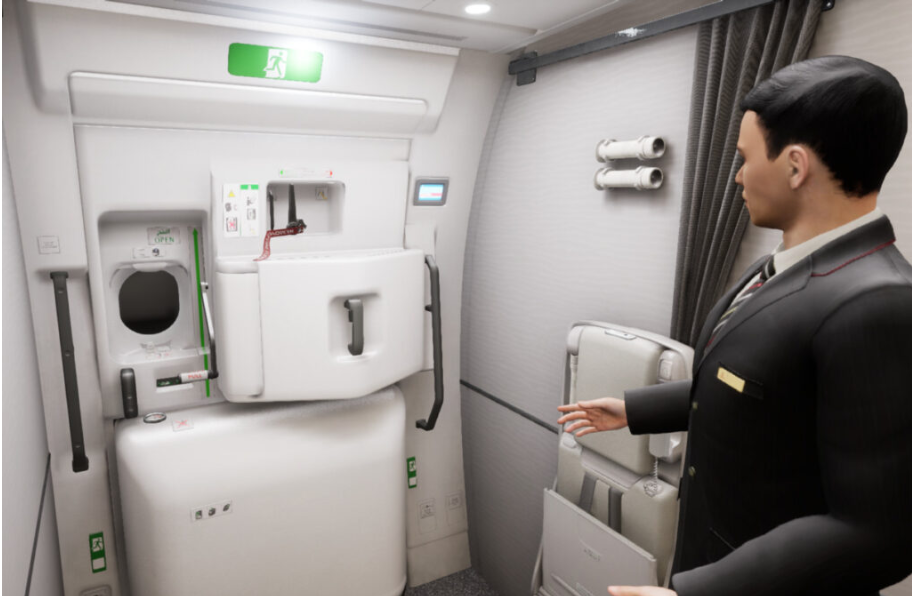
Emirates is elevating its flight safety program by expanding MIRA, its cutting-edge virtual reality platform, to incorporate cabin crew safety training. The airline’s workforce of nearly 23,000 cabin crew members is responsible for millions of passengers annually. They will soon undergo their mandatory Safety & Emergency Procedures (SEP) recurrent training through this innovative virtual system.
The sophisticated self-paced training program is compliant with all General Civil Aviation Authority (GCAA) requirements and international regulatory standards while maintaining Emirates’ world-class training benchmark.

This strategic shift represents a significant advancement in aviation training methodology, setting new industry benchmarks. At the heart of MIRA’s capabilities lies its extraordinarily detailed virtual environment. It features photorealistic cabin interiors of Emirates’ widebody fleet the Airbus A380, Boeing 777, and the latest addition, the Airbus A350 aircraft.
The platform provides immersive simulations of emergency slides, tarmac scenarios, airbridges, and various water and land situations, all rendered with unprecedented accuracy.
Enhanced by high-fidelity audio and sophisticated visual effects, the system incorporates multiplayer scenarios where avatars simulate crew interactions. This supports authentic procedure practice in a realistic team environment.
The initial MIRA SEP training focuses on two critical safety components: aircraft door operations and firefighting procedures, both cornerstone elements of onboard safety protocols.
Aircraft door operation is a particularly challenging skill requiring precise execution and extensive experience.
Incorrect handling can trigger unintended emergency slide deployment. This can potentially result in substantial damage to aircraft and airport infrastructure or cause serious injuries. This critical aspect underlies the mandatory annual SEP recurrent training requirement for all cabin crew members.
Through MIRA’s sophisticated virtual environment, crew members now have opportunities to perfect their door operation procedures. This repetitive practice capability significantly boosts skill retention and emergency preparedness.

The platform’s comprehensive firefighting training module represents another vital component of crew safety preparation.MIRA presents diverse emergency scenarios, including oven fires, overhead locker incidents, and bathroom emergencies. Crew members utilize virtual fire extinguishers complete with realistic smoke and flame effects, providing an immersive and true-to-life training experience.
We’re preparing our crew for Emirates’ ambitious future growth by seamlessly integrating cutting-edge technology with our leadership in training excellence, explains Capt Bader Al Marzooqi, Senior Vice President Flight Training.
With our substantial order of 315 new aircraft and plans to expand our cabin crew to 30,000 by 2030, efficient and effective SEP training is absolutely essential. MIRA enables us to rapidly scale our training capabilities while maintaining the highest standards of safety education.
The platform offers three distinct training modes through high-quality VR headsets: Teach, Practice, and Assessment. The system accommodates up to ten crew members simultaneously training in individual VR spaces. Instructors monitor comprehensive performance metrics to continuously enhance training programs.
Furthermore, Emirates has developed a mobile-friendly 2D version of the platform, enabling crew members to practice and refresh their knowledge anywhere, anytime. This can be conducted at home, during layovers, or while commuting.
This flexibility not only improves training accessibility but also significantly reduces the need for physical training facilities.
Launched in 2023 as an industry first, MIRA exemplifies Emirates Group’s commitment to innovation in aviation training. The platform permits interactive 3D virtual hubs, gamified learning environments, and simulated experiences. It raises the bar for aviation safety training worldwide.


